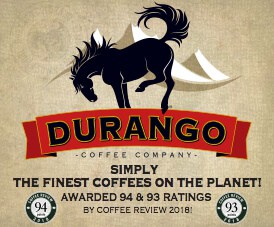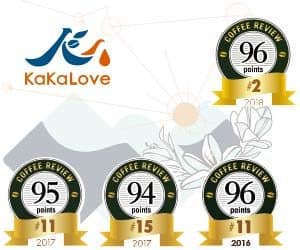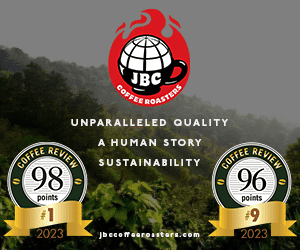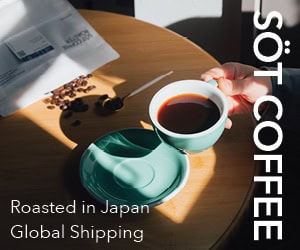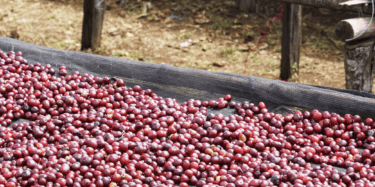Produced by Rigoberto Herrera of Granja La Esperanza, entirely of the Gesha variety of Arabica, and processed by a proprietary hybrid washed method, in which the whole cherries are fermented in water for 19-22 hours. Then, the fruit is depulped and undergoes a second fermentation begins, this time in parchment and mucilage for 35 hours. Founded in 2013, modcup coffee focuses on fresh roasting and
SEARCH RESULTS
Colombia Chiroso Caturra Washed
Produced at Finca Granito de Oro, entirely of the Caturra Chiroso variety of Arabica, and processed by the traditional washed method (fruit skin and pulp removed before drying). Founded in 2013, modcup coffee focuses on fresh roasting and distinctive natural-processed coffees. Visit modcup.com for more information.
Shop for the Top 30 Coffees of 2023
Resolve to Drink Better Coffee in 2024 If you're looking to drink better coffee in 2024, we’re pleased to help facilitate your shopping by providing links to roasters’ websites where some of the Top 30 coffees of 2023 may be available for purchase. As of the morning of Monday, January 1st, 2024, the Top 30 coffees below were available for purchase on roasters’ websites: No. 2 | Review | Shop
Wilton Benitez Colombia Sidra
This exceptional coffee was selected as the No. 4 coffee on Coffee Review’s list of the Top 30 Coffees of 2023. Produced by Wilton Benitez of Granja Paraiso 92, entirely of the Sidra variety of Arabica, and processed by the double-anaerobic thermal shock method, in which the coffee fruit, after having been first sanitized with ozone, undergoes two stages of fermentation. First, the whole cherries
Colombia Fruit Maceration Series Lulo Bear
Produced by Jairo Arcilo, entirely of the Castillo variety of Arabica, and processed by the anaerobic method, in which the coffee is fermented in the whole fruit with limited access to oxygen before drying. With this coffee, both wine yeasts and macerated lulo fruit were added to the ferment tank. Founded in 2013, modcup coffee focuses on fresh roasting and distinctive natural-processed coffees.
Colombia Wilton Benitez Double Anaerobic Thermal Shock Yellow Gesha
Produced by Wilton Benitez of La Macarena Farm, entirely of the Yellow Geisha variety of Arabica, and processed by a complexly detailed version of the double-anaerobic method (sealed-tank fermentation of the whole fruit with the addition of brewer’s yeast, removal of skin and pulp, and a second fermentation of the beans shut in the tank with the removed skin and pulp). Additional processing nuance
Colombia Finca Paraiso Gesha Wilton Benitez
Produced by Wilton Benitez entirely of the Geisha variety of Arabica. Processed by the kōji method, in which the coffee fruit is first sterilized and then fermented in a bio-reactor and inoculated with a selection of Japanese kōji (Aspergillus oryzae). This mold species breaks down starch into simple sugars and is commonly used in the production of soy sauce, miso, sake and shōchū. After
Colombia Finca La España Gesha
Produced by Duberney Cifuentes, entirely of the Geisha variety of Arabica, and processed by the traditional washed method (fruit skin and pulp removed before drying). Founded in 2013, modcup coffee focuses on fresh roasting and distinctive natural-processed coffees. Visit modcup.com for more information.
Colombia Pink Bourbon
Produced by Wilton Benitez entirely of the Pink Bourbon variety of Arabica and processed by a proprietary anaerobic fermentation method in which the coffee fruit is first sterilized, then fermented anaerobically in the whole fruit with added microorganisms for 36 hours. After this fermentation in the whole fruit, the coffee is subjected to thermal shock (first a high temperature to swell the
modcup
Colombia Castillo Fruit Maceration Series (Passionfruit)
Produced by Jairo Arcila and Cofinet of Finca Santa Monica entirely of the Castillo variety of Arabica, and processed by an experimental fruit maceration process in which the whole fruit is first fermented in an anaerobic (limited oxygen) environment with wine yeasts and macerated fruit. After fermentation, the coffee cherries are pulped and placed to dry on raised beds with macerated fruits until
Colombia Castillo Fruit Maceration Series (Grape)
Produced by Jairo Arcila and Cofinet of Finca Santa Monica entirely of the Castillo variety of Arabica, and processed by an experimental fruit maceration process in which the whole fruit is first fermented in an anaerobic (limited oxygen) environment with wine yeasts and macerated fruit. After fermentation, the coffee cherries are pulped and placed to dry on raised beds with macerated fruits until
Colombia Castillo Fruit Maceration Series (Strawberry)
Produced by Jairo Arcila and Cofinet of Finca Santa Monica entirely of the Castillo variety of Arabica, and processed by an experimental fruit maceration process in which the whole fruit is first fermented in an anaerobic (limited oxygen) environment with wine yeasts and macerated fruit. After fermentation, the coffee cherries are pulped and placed to dry on raised beds with macerated fruits until
Balearic Beans
A blend of natural-processed (dried in the whole fruit) coffees from Ethiopia and an experimentally processed, fruit-macerated Colombia. Founded in 2013, modcup coffee focuses on fresh roasting and distinctive natural-processed coffees. Visit modcup.com for more information.
Colombia Castillo Fruit Maceration Series (Peach)
Produced by Jairo Arcila and Cofinet of Finca Santa Monica entirely of the Castillo variety of Arabica, and processed by an experimental fruit maceration process in which the whole fruit is first fermented in an anaerobic (limited oxygen) environment with wine yeasts and macerated fruit. After fermentation, the coffee cherries are pulped and placed to dry on raised beds with macerated fruits until
Panama Elida Washed Gesha
Produced by the Lamastus family of Elida Estate, entirely of the celebrated Geisha variety of Arabica, and processed by the washed method (fruit skin and flesh are removed from the beans before they are dried). Founded in 2013, modcup coffee focuses on fresh roasting and distinctive natural-processed coffees. Visit modcup.com for more information.
Fruit Bombs Are the Point: Natural-Processed Espressos Defy Convention
The Coffee Review lab has smelled like a candy store for the last few weeks — a Willy Wonka factory for grownups. Of the hundreds of coffees we cup every year, a growing percentage of them are natural-processed. In the wine world, the word “natural” doesn’t mean anything in particular, is more of a marketing term designed to imply minimal intervention in the winemaking process. In coffee,
Fruit Bomb/Ethiopia Shantewene
Produced by Faysel Abdosh from distinctive traditional Ethiopian landrace varieties of Arabica long grown in the region. This lot was processed by the anaerobic natural method, in which fermentation of the whole fruit occurs in a hermetically sealed vessel. Founded in 2013, modcup coffee focuses on fresh roasting and distinctive natural-processed coffees. Visit modcup.com for more
Colombia Tres Dragones
Produced by Rigoberto and Rodrigo Herrera of Finca Potosi entirely of the Colombia variety of Arabica and processed by the natural method (dried in the whole fruit). modcup coffee, founded in 2013, focuses on fresh roasting and distinctive natural-processed coffees. Visit modcup.com for more information.
Colombia Cumbarco Lot 397
Produced by smallholding farmers surrounding the famous Café La Granja La Esperanza farm from trees of the Caturra, Castillo and Colombia varieties of Arabica, and processed by the traditional washed method at La Granja. modcup coffee, founded in 2013, focuses on fresh roasting and distinctive natural-processed coffees. Visit modcup.com for more information.


